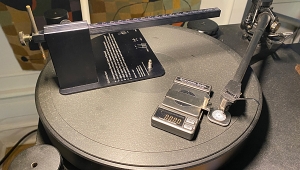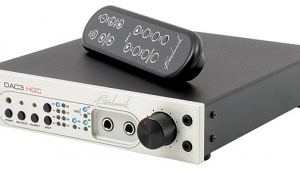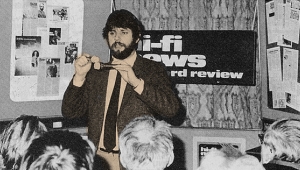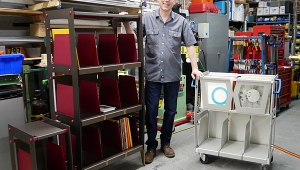| Columns Retired Columns & Blogs |
A Babel, a Babble . . . Page 7
Atkinson: Bob, you wrote in the September issue that because somebody carries out a measurement it inherently implies that he feels that that measurement means something.
Robert Harley: And I said we're not going to print a laundry list of meaningless specs, only if they're relevant to the review or to the product. We're not going to print every amplifier's THD...
Norton: We'll have that data available, though it won't necessarily all be printed, right? We can correlate it as we go along...
Lehnert: I'm going to go back to something that Gordon said quite a while ago, wondering whether the magazine is written for and to the general readership or toward the manufacturers. I think it has to be both. At all times. Because the manufacturers are part of the readership, and certainly one hopes that they're going to read and learn...
Atkinson: There is a third kind of reader who is very important, which is people who work in retail stores. I understand that the outcome of the Carver Challenge and the review of the production 1.0t amplifier in Vol.10 No.3 was a big drop in sales, not because the readers lost interest in the product but because people working in Carver dealerships decided they didn't want to sell it anymore. This is the sort of impact the magazine can have which is perhaps not suspected by many people.
Galo: Maybe this is a little bit naïve, but I would hate for anyone to buy a product simply because I gave it a favorable review. What I would hope would happen is that a positive review would give the reader some things to think about, and then the reader would go and hear the product. Maybe he would hear other things that had also been reviewed and then be able to ultimately make a decision on his own based on...
Ralph (the dog): Wa-oooo! [Larry's dog puts in his two cents' worth]
Galo: ...what he'd learned from reading the reviews.
Holt: How many stores do you think you could find where you would hear a product to advantage?
Norton: You try to find a store where you can make a comparison between cartridges, for example.
Atkinson: One of the things that retailers complain about audiophiles is that they go into their store and ask if they could listen to five $100 cartridges. If that retailer takes more than 15 minutes with that sale, then his profit is gone.
Galo: I agree that's a problem...
Holt: ...and is one that I don't see has a solution.
Galo: You may be right, but I would hope that one of the things that our magazine attempts to do, and I think does do, is to educate the readers so that they are capable of making decisions on their own as opposed to just accepting the word from on high, and believing everything that's said.
Lipnick: I agree 100%. I wish that were the case. But people come backstage after symphony concerts and say, "You're Lewis Lipnick, you write for Stereophile, we're tourists, we came up to Washington, can we bend your ear about equipment?" They say, "You wrote about this, it must be fantastic, you hear so much better than we do." I looked at one guy and said, "You've got a brain and two ears. You should use them." He says, "Yeah, but, you know so much more about this." I answered, "No, I listen to a lot, maybe to a lot more equipment, but it's your money, it's not my money!"
The problem is that we want to see it as people who will take what we say with a grain of salt, then will go listen to a component and decide for themselves whether they want to buy it or not. It doesn't work that way, unfortunately. These are people who are intelligent, but when they get into audio their mind turns to tapioca pudding. They want to be told what to buy. When these people buy a car, they'll read a review but they'll go test-drive that car, and if they don't like it they're not going to buy it. But yet at the same time they will read a review of a piece of audio equipment and say, "Oh wow! This has got to be the greatest thing since sliced bread!"
Deutsch: You said it was a religious experience. Religious people want to be told what the "divine truth" is rather than to find out for themselves.
Lipnick: But it's not right. They should be aware of what they hear. When I write a review, I try to say this is what I heard, this is my opinion, but I say it may not be your opinion, and before you go drop ten grand, you should go listen to this. And if you don't like it, for heaven's sake don't buy it! But it doesn't work that way.
Atkinson: Half the readers will say, "Hey, this guy's copping out. He isn't sure of his own opinion."
Holt: What's the alternative?
Lipnick: Well, the alternative is perhaps to put an article in there talking about: "Hey, reviews are very important, and yes, people who write reviews probably have more experience listening to this stuff than you do. However, when you read a review, you should then say to yourself, 'Well, if it's a very expensive piece maybe I should spend the money for an airplane ticket to New York and spend a couple of days there listening to the stuff before I drop 20 grand on a system.'...If you're going to spend a lot of money, you should spend maybe five or six hundred or a thousand dollars, do a little vacation, go listen to this stuff, really listen to it, and make sure it's what you want."
Atkinson: I should point out here that Lew made himself very unpopular among the Washington-area retailers by advising in a Washington newspaper last Fall that people in that area should go to New York to listen to equipment. [laughter]
Lipnick: I wrote that if you really want to find out what high end's about, you should go to New York, spend a week up there. Then you'll learn about high end. And it's true!
- Log in or register to post comments




































